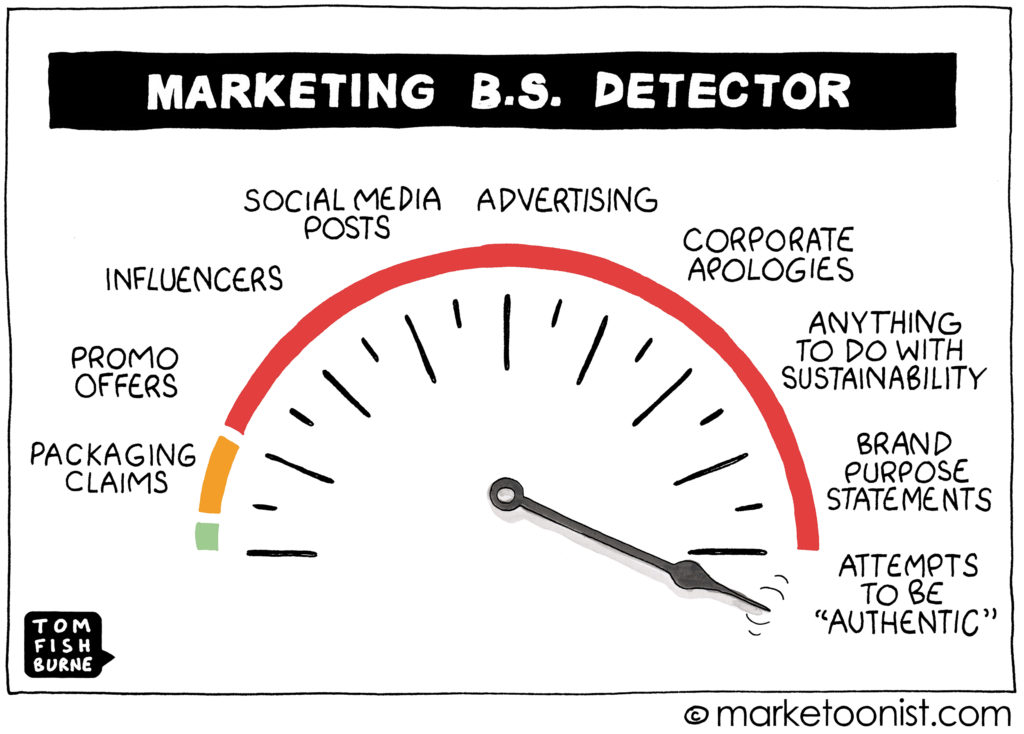“Brand purpose truly is a bunch of crap, because it’s disingenuous. You’re saying, ‘My purpose is to make the world a better place’. No, your purpose is to make money…”
So said YUM! brands CMO Ken Muench who oversees global marketing for KFC, Pizza Hut, and Taco Bell in a recent interview for Marketing Week.
In this one sentence Muench manages to get it exactly right, and at the same time, exactly wrong.
He is correct in saying that the purpose of brands is to make the world a better place is “garbage” because, unless you are an NGO or charity devoted to a particular cause, environmental and social issues will always play second fiddle to other business priorities.
He went on to say that while he believes brands should take steps to improve aspects of how they run their business and their impact on society, this shouldn’t be the basis of their marketing. We agree. And so do customers.
A survey of 2,000 British adults released on the 11th January 2022, conducted by Hanbury Strategy and Stack Data Strategy, found that almost 70 per cent of respondents said that firms should focus on communicating how they treat their employees or customers when they make public statements. They went on to report that while businesses need to address environmental, social and governance issues 44 per cent of respondents felt they should prioritise employees and customers.

Even those brands that are a byword for ethical business agree with this approach. Patagonia, the active lifestyle clothing brand has championed responsible manufacturing and retail and has been making fleeces from recycled bottles since the 1990’s. It encourages its customers to recycle and repair rather than buy and it repaired more than 100,000 garments in 2020. Even so, its boss, Ryan Gellert recently said; “I defy any company with any scale that makes anything to really justify that they meet the definition of sustainable”.
One of our favourite brands, and one that epitomises this approach is Lush the cosmetic retailer that has nearly 500 stores around the world. Mark Constantine co-founder and Chief Executive says, “Commercially speaking, really good environmentalism comes down to top-class service and selling things people really want and that they keep.”
So, let’s agree that having a brand purpose which is focused on societal issues isn’t going to wash. Why then was Ken Muench also exactly wrong in his assertion? Because he concluded, “No, your purpose is to make money…”
This belief echoes the teaching of the economist Milton Friedman who published his book ‘Capitalism and Freedom’ in 1962 and who influenced much of the economic thinking for the next 50 years. He said; “There is one and only one social responsibility of business – to use its resources and engage in activities designed to increase its profits so long as it stays within the rules of the game, which is to say, engages in open and free competition without deception or fraud.”
In other words, Friedman’s view was that the primary purpose of any business is to make money for shareholders. This belief has led to many of the problems we have experienced over the past twenty years despite Friedman’s warning about the need for fairness. The great financial crisis of 2008 and the failure of Lehman Brothers among many others; the corporate scandals of firms like VW, BP and more recently, Theranos, who all set greater store on the pursuit of profit above acting with integrity.
This single-minded pursuit of profit has led to short-term, self-serving behaviour on the part of executives often because their remuneration is tied to share price rather than creating true value. So, we have seen share buy backs to boost stock price rather than investing spare cash in R&D; declining levels of productivity and a widening gap between executive pay and their employees. By 09.00 on 7th January 2022 the average FTSE 100 chief executive had earned as much in 2022 as the average worker in Britain will make in the whole of the year. In the US it is even more extreme. Tim Cook, the boss of Apple makes a staggering 1,447 times the income of the average Apple employee. To be fair to Tim Cook, he has created tremendous value for Apple but that is not true for many firms.
So, if the purpose of a brand is not social and we are suggesting that it should not be commercial, then what should it be?
In our book, On Purpose – delivering a branded customer experience people love’ Andy Milligan and I argue that there are three types of purpose:
- Brand – creating value for customers and employees.
- Commercial – creating value for stakeholders and executives.
- Social – creating value for broader society.
The best brands balance these and see them as connected. But they believe that the place to start is with brand purpose (i.e., satisfying the needs of your customers) because, according to the annual BrandZ most valuable brands survey, if you do that it inevitably leads to commercial success and shareholder returns. And if you do that in a way which is socially responsible, then you can sustain success long-term.
Let’s take Amazon as an example. Since its inception, Amazon has focused relentlessly on its brand purpose “To be the earth’s most customer-centric company”, creating tremendous value for customers rather than the return for shareholders. Today, along with Apple, Amazon is the world’s most valuable company and Jeff Bezos is one of the wealthiest people on the planet. The company has pledged $10bn to addressing climate change and has a target of using 100% renewable energy by 2025. Already they have one of the largest solar panel installations in Europe at their fulfilment centre in Tilbury with 11,500 solar panels, enough to power 700 homes for a year. Amazon has, however, been justifiably criticised for the quality of its employee experience as well as its readiness to pay taxes in the markets in which it operates. If it addresses these two issues and, in so doing, balances our three purposes, it will likely be successful for some time to come.
But it starts with brand purpose. Let me finish with a personal example. I have always loved Hellmann’s mayonnaise. I would look out for that squat jar with the blue label on the supermarket shelves, except now I don’t. This brand that has been producing superior sauces since 1913 is now part of Unilever and is required, along with all their other brands, to have a ‘purpose’. Hellmann’s is to ‘inspire and enable 100 million consumers every year to be more resourceful with their food and waste less’. Unfortunately, they achieved the opposite. They have switched to a recycled plastic squeezy bottle. The problem is, the lovely thick sauce, which is their USP, is too glutinous to be easily squeezed out and too thick to allow air back in, so you end up with a vacuum in the container and cannot get the last quarter out whatever you do and end up throwing it away. The old jar allowed easily measured portions from a spoon right to the bottom. So, Hellmann’s save me from your marketing B.S. and put my needs first.
When we work with our clients to help them define brand purpose, we start with a deep understanding of what customers expect and value. That should be the basis for your purpose.
Shaun Smith
Founder Smith+Co




